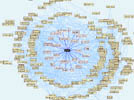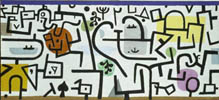Posted: June 11th, 2003 | 1 Comment »
Après l’Empire (Emmanuel Todd) p.48:
“Il faut, même si c’est difficile et paraître contredire l’évidence, accepter l’idée que les crises, les massacres que nous décrivent inlassablement les médias, ne sont pas, le plus souvent, des phénomènes siimplement régressifs mais des dérèglement transitoires, liés au processus même de modernisation. Et que, mécaniquement, une stabilisation doit succéder aux troubles, en l’absence de toute intervention extérieure.“
Posted: June 10th, 2003 | No Comments »
As read in the very good Smarter, Simpler Social:
“The behaviour of smart mobs, and in some respects online blogging communities, exhibit many of the features of what scientists call complex systems : they are emergent, highly connected with intricate inter-relationships, self-organising and simple on the micro level but create effects that appear complex and unpredictable on the macro level; plus, they tend to evolve through rapid collaboration or feedback loops. In the physical world, such systems (arguably human evolution is one example) are not necessarily the most efficient, but they are highly adaptive to changing conditions and they generally get the job done. Complexity theory has become a very popular way of thinking about the behaviour of biological, meteorological, financial, social and other systems, and it has helped us understand that apparently turbulent and chaotic systems actually have a tendency to create their own non-linear order.“
Posted: June 10th, 2003 | No Comments »
An analysis of internal e-mail exchanges maps companies informal structure. One can see who talks to whom and therefore know who holds the power. The map also shows the teams in which people actually work, as opposed to thoses they are assigned to and it highlights the communities of practice (informal collaborative netwoks).
More in the article “E-mail reveals real leaders“
Posted: June 7th, 2003 | No Comments »
A social network caught in the Web is reaserch paper on the study of a real world social network within a community web site. The authors studied the behavior and interactions (e.g. how personality and interests influence one’s choice of friends) among the members of the Club Nexus at Stanford University.
Small World Phenomenon:
In analyzing the social network we observered a small world effect, where the distance between any two users, measured in the number of hops along the Nexus Net, is only 4 on average. This average might at first seem low in view of the fact that Club Nexus represents a diverse group of users, both undergraduates and graduates at various stages in their studies representing many departments. The is the counterintuitive aspect of the small world phenomenon; individuals tend to socialize in smaller cliques, often determined by factors such as year in school, department or dorm, yet any two user are seperated by only a small number of hops.

Conclusion:
Our analysis was able to detect many expected trends (e.g. English majors liking to spend their free time reading or people sharing a narrow or unusual interested becoming friends), while at the same time finding non-obvious relationships (e.g. “responsible” people being perceived as slightly less “cool”). What makes Club Nexus special is that one is able to observe these patterns on a large scale with many different variables
Posted: June 6th, 2003 | No Comments »
Some people relativly new to the Internet are not aware of the Netiquette, but naturally seem to create their own. I was explained for example that a question ending with “?” means no answer is needed (“how are you?”), with “??” means an answer is required if not agreeing (“we meet at 5pm??”) and “???” (“how many people are coming???”) means an answer is required. The same goes with the use of “!” and the use of capital letters (yelling using capital letters is not always interpreted as so). Moreover these people are often very SMS and Chat system literate which tends to affect the way they write emails or online comments. Shortened or phoneticaly spelled words as well as a tendency to emphasise sentences with emotions (increasing use of smileys) are now common. I should start a study the evolution of the Netiquette or what I call the neo-netiquetism 
Posted: June 6th, 2003 | No Comments »
Day off in Basel to visit the Kunstmuseum and the Beyeler Foundation. “Sites of Impressionism” at the Kunstmuseum featured The combination and juxtaposition of inpressionst painting and photography. The “Expressive!” exhibition at the Beyeler Foundation comprised expressionist paintings, sculptures and specimens of graphic art.
The impressionist style of painting is characterized chiefly by concentration on the general impression produced by a scene or object and the use of unmixed primary colors and small strokes to simulate actual reflected light.
Expressionism: movement in fine arts that emphasized the expression of inner experience rather than solely realistic portrayal, seeking to depict not objective reality but the subjective emotions and responses that objects and events arouse in the artist
Special exhibitions put aside, Paul Klee’s “Reicher Hafen (ein Reisebild)” stays my personal favourite in Basel 
Posted: June 4th, 2003 | No Comments »
En systèmique, le concept de système correspond au besoin d’un outil conceptuel nouveau, capable d’aider à résoudre ou comprendre des problèmes complexes dans des domaines divers.
Un système est un ensemble d’unités en interrelations mutuelles. Il y a la notion d’interrelation et de la totalité (composée d’éléments).
Quatres concepts fondamentaux:
L’interaction: elle comporte une double action de A à B et de B à A. Une forma particulière de l’interaction étant la rétro-action (ou du feedback)
La globalité: un système est composé d’éléments mais il n’est pas réductible à ses parties. Le tout est davantage qu’une forme globale, il suppose l’apparition de propriétés émergentes que ne possèdent pas ses parties.
L’organisation: il s’agit de l’agencement de relations entre composants et individus qui produit une nouvelle unité possédant des qualités que n’ont pas ses composants (possible auto-organisation du système).
La complexité: elle tient au moins à trois séries de causes: celles inhérentes à la composition du système (nombre, caractérisitquue et liaisons du système), celle provenant de l’incertitude propre à l’environnement du système et les rapports ambigus entre hasard et déterminisme.
Pour décrire un système, on peut adopter deux points de vues:
L’aspect structurel: une frontière (séparant le système de son environnement – avant des entrées et des sorties qui matérialisent les rapports entre le système et son environnement), des éléments (identifiables et hétérogènes), un réseau de relation et de des réservoirs.
L’aspect fonctionnel: flux, centre de décision, boucles de rétroaction et délais de réponses
Posted: June 4th, 2003 | No Comments »
The practice of understanding complexity can also be applied to social software.
Bill Thompson:
“Treating all the many tool and services that allow people to interact with each other over the network as a single thing, demonstrates yet again the Western desire for simplification and regimentation instead of seeking to understand the complexity”.
Posted: June 4th, 2003 | No Comments »
As read in an excellent paper about social software “A little less conversation” by Bill Thompson for the BBC Technology News (read on nico’s mind bazar):
“It is now possible to have a serious debate about the social impact of the Internet without mentioning protocols, packets or programming, and that in itself is significant progress”
In fact, Bill Thompson argues that the current buzzword “social software” is anything new (there have been decades of researches into theses problems) and it is far from being at the beginning of a reorganisation of our society and our essential human nature. However he rightly points out that “it is a vital and necessary stage in the development of our thinking about the Internet, since instead of talking about it as a technology we are arguing about how we relate to other people, and the software and networks are just the ways in which we do it”.
Posted: June 4th, 2003 | No Comments »
Since I have been developping a web-based application to improve workshop preparation and organization, here is a paper to introduce me to the world of Computer Supported Collaborative Work (CSCW) and its issues. In summary:
The ability to communicate via computer may decrease the number of face-to-face interactions for individuals who are co-located and increase the number of interactions and collaborations for individuals who are remote. Technology is changing who we can communicate with and how we work. The introduction of groupware led to the increase in efficiency (more effective task perfomance) and reduction in detailed feedback (less detailed information from co-workers – trade-off between efficency and richness of information). When face-to-face interaction is not always possible technology increas interactions and collaboration with the additional benefit of providing shared information.
Read the rest of this entry »





